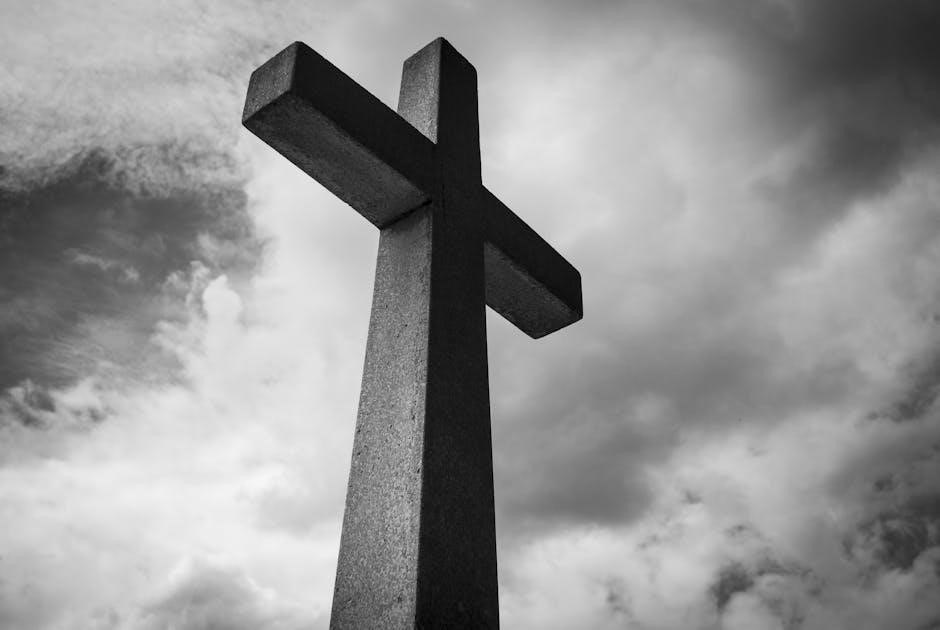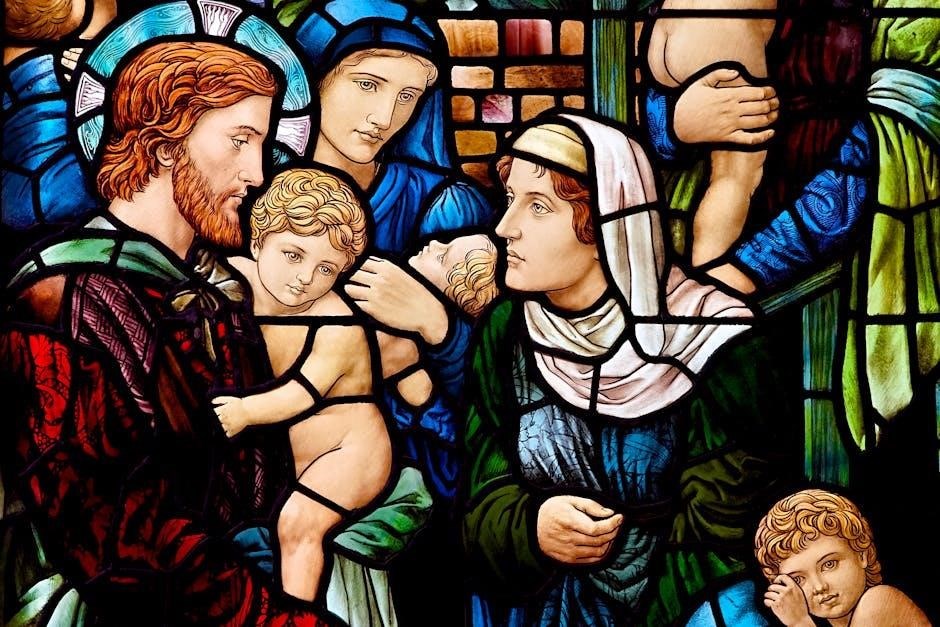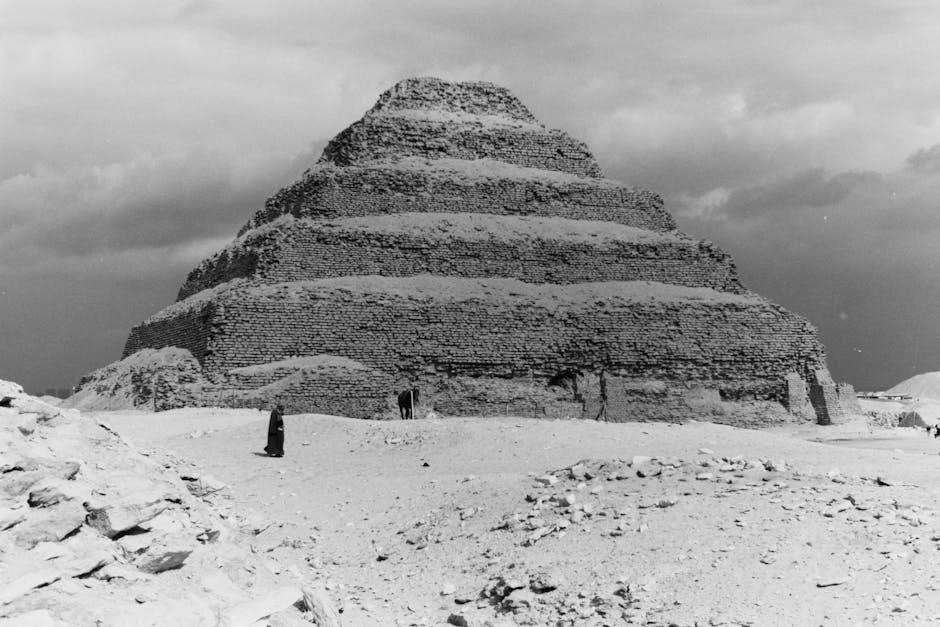The Kingdom of God and Kingdom of Heaven are central theological concepts in Christianity, often used interchangeably but carrying distinct nuances in Scripture and interpretation.
1.1 Background and Context of the Kingdom of God and Kingdom of Heaven
The Kingdom of God and Kingdom of Heaven are profound theological concepts rooted in Christian Scripture, particularly in the New Testament. The Kingdom of God is frequently mentioned across various books, while the Kingdom of Heaven is exclusively found in the Gospel of Matthew. Both terms evoke a divine, eternal realm under God’s sovereignty. Historically, kingdoms are monarchies with a ruler, but these spiritual kingdoms differ, emphasizing God’s reign and redemptive plan. Understanding their context is crucial for grasping their theological significance and role in Christian doctrine.
1.2 Importance of Understanding the Differences
Understanding the distinctions between the Kingdom of God and Kingdom of Heaven is vital for theological clarity and spiritual growth. While some view them as synonymous, others recognize subtle differences in emphasis and context. The Kingdom of God often highlights God’s universal sovereignty and redemptive work, while the Kingdom of Heaven, primarily in Matthew, may emphasize the messianic and eschatological aspects. Grasping these nuances enriches one’s understanding of Christian doctrine, aiding believers in living out their faith effectively and preparing for eternal life. This clarity also fosters deeper worship and alignment with God’s divine plan.
1.3 Overview of the Article Structure
This article provides a comprehensive analysis of the differences and similarities between the Kingdom of God and the Kingdom of Heaven. It begins with an introduction to the topic, followed by a detailed exploration of biblical definitions and references. Theological perspectives, both historical and modern, are examined to provide depth. The article then delves into the similarities and differences between the two kingdoms, including their scriptural usage and theological emphases. Practical implications for believers are discussed, concluding with a synthesis of the material to enhance understanding and application. Each section builds on the previous, offering a thorough exploration of the subject.

Biblical Definitions and References
The Kingdom of God and Kingdom of Heaven are central biblical concepts, primarily found in the New Testament, with the former appearing 68 times across 10 books and the latter 32 times, exclusively in Matthew, often interpreted as synonymous.
2.1 The Kingdom of God in the New Testament
The Kingdom of God is a predominant theme in the New Testament, particularly in the Gospels of Matthew, Mark, and Luke. It is frequently mentioned in the teachings of Jesus Christ, who often used parables to illustrate its nature, such as the parable of the mustard seed and the parable of the sower. The Kingdom of God is depicted as both a present reality and a future hope, emphasizing God’s reign over His people. It encompasses themes of redemption, forgiveness, and the restoration of God’s relationship with humanity. The New Testament also highlights the Kingdom’s universal scope, extending beyond Israel to include all nations.
2.2 The Kingdom of Heaven in the Gospel of Matthew
The Kingdom of Heaven is a central theme in the Gospel of Matthew, where it is mentioned frequently as a key aspect of Jesus’ teachings. It is often used interchangeably with the Kingdom of God, though Matthew exclusively uses the term “Kingdom of Heaven.” This phrase emphasizes God’s eternal reign and divine authority, highlighting themes of righteousness, obedience, and the ultimate fulfillment of God’s plan. The Kingdom of Heaven in Matthew is portrayed as both a present reality and a future hope, with Jesus’ parables and teachings illustrating its nature and requirements for entry.
2.3 Key Biblical Passages and Their Interpretations
Key biblical passages, such as Luke 17:21 and Matthew 25:31-46, provide insights into the Kingdom of God and the Kingdom of Heaven. Luke 17:21 emphasizes the Kingdom of God as a spiritual reality within believers, while Matthew 25:31-46 describes the Kingdom of Heaven in an eschatological context, focusing on judgment and separation of the righteous. Other passages, like Matthew 13, use parables to illustrate the Kingdom’s nature, growth, and ultimate triumph. These scriptures highlight the Kingdom’s present and future aspects, emphasizing its divine authority and the necessity of righteousness for entry.

Historical and Theological Perspectives
Historical and theological perspectives reveal evolving understandings of the Kingdom of God and Heaven, shaped by early Christian views, theological debates, and modern doctrinal interpretations.
3.1 Early Christian Understandings of the Kingdom
Early Christians viewed the Kingdom through the lens of Jesus’ teachings, emphasizing its present spiritual reality and future fulfillment. They saw it as a divine rule breaking into the world, transforming lives and communities. The Kingdom was understood as both a gift and a call to live according to God’s will, reflecting themes of love, forgiveness, and justice. This perspective was deeply rooted in Old Testament promises and the prophetic hope of a restored Israel, yet expanded to include Gentiles, creating a universal community under God’s sovereignty.
3.2 Theological Debates Through the Centuries
Throughout history, scholars and theologians have debated the nature of the Kingdom, with interpretations evolving over time. Some viewed it as a future, physical reign of Christ, while others emphasized its present, spiritual dimensions. Augustine’s “City of God” influenced early views, contrasting the earthly and heavenly kingdoms. The Reformation brought new perspectives, with Luther and Calvin focusing on the Kingdom as a spiritual realm governed by grace. Modern theologians continue to explore its implications, balancing eschatological hope with ethical living. These debates reflect the complexity and richness of the Kingdom’s meaning in Christian thought and practice.
3.3 Modern Interpretations in Christian Doctrine
Modern Christian doctrine offers diverse perspectives on the Kingdom, blending traditional theology with contemporary insights. Many scholars emphasize the Kingdom as both present and future, where believers experience its spiritual realities now while awaiting its full eschatological fulfillment. Some interpretations highlight the Kingdom’s universal and inclusive nature, aligning with God’s redemptive plan for all creation. Others focus on its transformative power, calling believers to live out Kingdom values like justice, love, and compassion in the world. These views reflect a dynamic understanding, integrating historical teachings with modern contextual applications, ensuring the Kingdom remains a central, evolving theme in Christian faith and practice.

Similarities Between the Kingdom of God and Kingdom of Heaven
Both kingdoms represent God’s eternal, divine rule, emphasizing Jesus’ central role and shared themes of love, redemption, and eternal life, reflecting God’s sovereign plan for humanity.
4.1 Shared Themes in Scripture
The Kingdom of God and the Kingdom of Heaven share core themes in Scripture, emphasizing God’s sovereignty, humanity’s redemption, and eternal life. Both concepts highlight Jesus’ teachings on love, forgiveness, and the importance of spiritual transformation. They underscore the ultimate goal of unity with God, reflecting His divine plan for humanity. These kingdoms are often described as present realities and future hopes, intertwining the temporal and eternal. Their shared imagery, such as the Beatitudes and parables, reinforces their common purpose: to reveal God’s reign and humanity’s calling to live under His gracious rule.
4.2 Both Kingdoms as Eternal and Divine
Both the Kingdom of God and the Kingdom of Heaven are understood as eternal and divine realms, reflecting God’s eternal sovereignty. They are not limited by time or space, as they exist beyond human history and will culminate in the new heaven and new earth. Their divine nature emphasizes God’s ultimate authority and redemptive plan for humanity. While the Kingdom of God is often seen as a present spiritual reality, the Kingdom of Heaven is frequently associated with a future, eternal state. Both kingdoms are intertwined, showcasing God’s eternal purpose to reign over all creation in love and righteousness.
4.3 The Role of Jesus Christ in Both Kingdoms
Jesus Christ is central to both the Kingdom of God and the Kingdom of Heaven, embodying their divine and eternal purposes. As the King, He reigns supremely in both realms, fulfilling God’s plan of redemption. In the Kingdom of God, Jesus’ teachings emphasize His present spiritual reign over believers’ hearts. In the Kingdom of Heaven, He is the future ruler of the eternal, glorified state. Both kingdoms highlight His mission of salvation, grace, and eternal life, with Jesus as the ultimate authority and savior. His role unites both realms, showcasing His divine sovereignty and humanity’s participation in God’s eternal plan.

Differences Between the Kingdom of God and Kingdom of Heaven
The Kingdom of God emphasizes God’s present spiritual rule, while the Kingdom of Heaven focuses on the future eternal state, highlighting distinct theological and eschatological perspectives.
5.1 Scriptural Usage and Frequency
The Kingdom of God is mentioned 68 times in the New Testament across 10 books, while the Kingdom of Heaven appears 32 times, exclusively in Matthew. This distinction highlights different emphases in Scripture. The Kingdom of God is a broader concept, reflecting God’s sovereignty and rule, while the Kingdom of Heaven, often used interchangeably, carries a specific eschatological focus in Matthew’s narrative. The frequency and context of these terms reveal nuanced theological perspectives, with the Kingdom of God emphasizing divine authority and the Kingdom of Heaven often linking to future eternal realms.
5.2 Distinctions in Theological Emphasis
The Kingdom of God often emphasizes God’s present and future reign, focusing on spiritual transformation and divine sovereignty, while the Kingdom of Heaven, particularly in Matthew, underscores eschatological aspects. The Kingdom of God highlights Jesus’ teachings on God’s active rule in believers’ lives, whereas the Kingdom of Heaven frequently relates to future eternal life and heavenly rewards. These distinctions shape theological discussions, with the Kingdom of God stressing spiritual realities and the Kingdom of Heaven often pointing to future promises, yet both unite in proclaiming God’s ultimate triumph and eternal plan.
5.3 Different Key Concepts and Imagery
The Kingdom of God is often depicted through parables like the mustard seed and yeast, symbolizing growth and God’s transformative power. In contrast, the Kingdom of Heaven, as described in Matthew, frequently uses imagery like treasures, weddings, and harvests, emphasizing eschatological judgment and heavenly rewards. These differing metaphors reflect distinct theological priorities, with the Kingdom of God focusing on spiritual growth and divine presence, while the Kingdom of Heaven highlights future glory and eternal inheritance, providing rich yet varied perspectives on God’s reign in both the present and the future.

The Kingdom of God
The Kingdom of God is both a present spiritual reality and a future earthly reign, emphasizing divine sovereignty and humanity’s redemption through Christ’s transformative power.
6.1 The Present and Future Aspects of the Kingdom
The Kingdom of God exists both now and in the future. Currently, it is a spiritual realm where believers experience God’s rule through faith and obedience. Jesus’ teachings and miracles demonstrated its present reality. In the future, it will manifest as a physical kingdom on earth, lasting 1,000 years, followed by eternal existence in the new heaven and new earth. This dual aspect underscores God’s ongoing sovereignty and redemptive plan, blending the “already” with the “not yet” in Christian eschatology.
6.2 The Kingdom as a Spiritual Realm
The Kingdom of God is primarily a spiritual realm, entered through faith and grace, where believers experience God’s rule in their hearts. It is not confined to geography but is a divine, eternal reality where love, forgiveness, and service define relationships. Jesus’ teachings and the Holy Spirit’s presence manifest this kingdom, emphasizing inner transformation and alignment with God’s will. While it has future physical dimensions, its essence is spiritual, accessible now to all who trust in Christ, making it a present and eternal reality rooted in God’s sovereignty and love.
6.3 The Kingdom in the Context of God’s Sovereignty
The Kingdom of God is deeply rooted in God’s sovereignty, emphasizing His supreme authority over all creation. It reflects His eternal plan to reign over hearts and nations, fulfilling His will. This kingdom is not limited to human control but is a divine realm where God’s power and love govern. His sovereignty ensures the kingdom’s ultimate triumph, aligning human history with His purpose. Through Christ, believers participate in this reign, experiencing God’s rule in their lives and looking forward to its full realization in eternity, where His dominion will be unchallenged and glorious.

The Kingdom of Heaven
The Kingdom of Heaven, predominantly mentioned in Matthew’s Gospel, represents God’s eternal, divine rule over humanity, emphasizing spiritual transformation and eternal life through faith in Jesus Christ.
7.1 The Kingdom as Described in the Gospels
In the Gospels, particularly Matthew, the Kingdom of Heaven is depicted as a divine realm where God’s will prevails. It is often illustrated through parables, such as the mustard seed and hidden treasure, emphasizing its transformative and unexpected nature. Jesus’ teachings highlight the Kingdom as a place of eternal life, righteousness, and divine rule. The Gospels portray the Kingdom as both a present reality and a future hope, where believers will dwell with God in eternal fellowship. This dual perspective underscores its spiritual and eschatological dimensions.
7.2 The Kingdom of Heaven and the Church
The Kingdom of Heaven is closely tied to the Church, which serves as the earthly community of believers. While the Church is not the Kingdom itself, it functions as a vessel through which the Kingdom’s values and teachings are manifested. The Church’s mission is to preach the Gospel, baptize, and disciple, preparing hearts for the Kingdom. It acts as a spiritual body, unifying believers under Christ’s authority. However, the Kingdom transcends the Church, encompassing all creation under God’s sovereignty. The Church, therefore, is both a reflection and a preparatory institution for the ultimate realization of the Kingdom of Heaven.
7.3 The Kingdom of Heaven in Eschatological Context
The Kingdom of Heaven holds significant eschatological implications, often associated with the future fulfillment of God’s plan. It is viewed as a future reality where God’s rule is fully established on earth, culminating in the Millennium and the new heaven and new earth. This kingdom is eternal, transcending time, and will be fully realized after Christ’s return. The eschatological Kingdom of Heaven represents the ultimate consummation of God’s redemptive plan, where His sovereignty is unchallenged, and believers dwell in eternal fellowship with Him. This perspective underscores the Kingdom’s future aspect, distinct from its present spiritual dimensions.

The Relationship Between the Two Kingdoms
The Kingdom of God and the Kingdom of Heaven are interconnected, both representing God’s reign, with the former emphasizing spiritual aspects and the latter focusing on future fulfillment.
8.1 Are They the Same or Different?
Scholars and theologians often debate whether the Kingdom of God and the Kingdom of Heaven are identical or distinct concepts; While some argue they refer to the same divine reign, others highlight differences in emphasis. The Kingdom of God is frequently associated with God’s universal sovereignty and spiritual rule, often emphasized in the New Testament. In contrast, the Kingdom of Heaven, predominantly found in Matthew’s Gospel, may stress future eschatological aspects or the Church’s role. Despite these nuances, both kingdoms ultimately reflect God’s eternal and redemptive plan, with their distinctions lying in scriptural context and theological focus rather than contradictory meanings.
8.2 The Role of the Church in Both Kingdoms
The Church plays a vital role in both the Kingdom of God and the Kingdom of Heaven, serving as the earthly manifestation of God’s divine rule. It acts as a vessel for advancing the Kingdom of God by spreading the Gospel and fostering spiritual growth among believers. In the context of the Kingdom of Heaven, the Church prepares believers for eternal life and participation in God’s eternal plan. The Church’s mission is to embody the values of both kingdoms, fostering community, worship, and service, while awaiting the ultimate fulfillment of God’s reign in the eschatological future.
8.3 The Ultimate Unity of God’s Kingdom
The ultimate unity of God’s Kingdom reveals that both the Kingdom of God and the Kingdom of Heaven are part of one eternal, divine plan. Despite their distinct emphases, they converge in the eschatological vision of God’s reign over all creation. The New Heaven and New Earth symbolize the final consummation of this unity, where Christ’s rule will be fully realized. The Church serves as a bridge, embodying this unity now and preparing believers for the eternal fusion of both kingdoms under God’s sovereign will. This unity underscores the seamless integration of God’s purposes across time and eternity.

Eschatological Aspects of Both Kingdoms
The Kingdom of God and Kingdom of Heaven both point to God’s eternal plan, with the Kingdom of God often linked to the Millennium and the Kingdom of Heaven to the New Earth, emphasizing their ultimate unity in God’s sovereignty.
9.1 The Millennium and the Kingdom of God
The Millennium, a 1,000-year period, is often associated with the Kingdom of God as a time of divine rule on Earth. During this era, Christ will reign, and Satan will be bound, ushering in peace and righteousness. This period is seen as a fulfillment of Old Testament prophecies and a precursor to the eternal Kingdom of God. Believers will participate in governance, and God’s sovereignty will be fully realized. The Millennium reflects the transitional phase of God’s Kingdom, bridging the present age and the eternal state, emphasizing His ultimate triumph and the redemption of creation.
9.2 The Kingdom of Heaven in the New Earth
The Kingdom of Heaven is deeply connected to the New Earth, representing the eternal fulfillment of God’s plan. After the Millennium, the New Earth will emerge, free from sin and death, where God will dwell with humanity forever. The New Jerusalem, a symbol of God’s presence, will descend, and believers will live in harmony with Him. The Kingdom of Heaven in the New Earth emphasizes eternal peace, joy, and worship, where God’s glory will fully illuminate all creation. This eternal state signifies the ultimate realization of God’s Kingdom, where His people will reign with Him in perfect unity and love.
9.3 The Final Consummation of God’s Plan
The final consummation of God’s plan signifies the ultimate fulfillment of His purposes, where both the Kingdom of God and the Kingdom of Heaven reach their eternal culmination. This involves the return of Christ, the resurrection of believers, and the final judgment, leading to the establishment of a new, sinless order. The New Earth and New Heaven will unite, creating an eternal realm where God’s glory shines without hindrance. Believers will live in perfect harmony with Him, experiencing eternal life and joy. This final stage marks the complete realization of God’s sovereignty and the eternal unity of His Kingdom, where His will is fully accomplished.

Practical Implications for Believers
Believers are called to live according to God’s will, seeking spiritual growth and kingdom-mindedness. This involves practicing love, humility, and service, aligning with Christ’s teachings to prepare for eternal life.
10.1 Living in the Kingdom of God Today
Believers are called to live as citizens of the Kingdom of God, trusting in His sovereignty and grace. This involves embracing a life of love, humility, and service, reflecting Jesus’ teachings. By prioritizing spiritual growth and aligning actions with God’s will, believers demonstrate Kingdom values in daily life. Living in the Kingdom today means surrendering to God’s authority, relying on His power, and fostering relationships built on compassion and forgiveness. It is a life of purpose, guided by the Holy Spirit, and focused on eternal priorities rather than temporal gains.
10.2 Preparing for the Kingdom of Heaven
Preparing for the Kingdom of Heaven involves living a life aligned with God’s will and seeking spiritual holiness. Believers are called to repent, trust in Jesus, and pursue righteousness. This preparation requires a deepening relationship with God through prayer, worship, and obedience to His Word. It also involves loving others, forgiving offenses, and living with humility. By prioritizing eternal values over temporal ones, believers demonstrate readiness for the Kingdom of Heaven. This preparation is not about earning salvation but about living in a way that reflects God’s transformative work in their lives, ensuring they are spiritually ready for His eternal realm.
10.3 The Christian’s Role in Both Kingdoms
Christians play a vital role in both the Kingdom of God and the Kingdom of Heaven. In the Kingdom of God, believers are called to live as ambassadors of Christ, demonstrating His love and justice in the world. They are tasked with spreading the Gospel, serving others, and advancing God’s reign through their actions and prayers. In the Kingdom of Heaven, Christians will worship and reign with Christ eternally. Their role involves preparing for this future reality by living faithfully and trusting in God’s plan. Together, these roles emphasize the Christian’s dual responsibility to live out their faith now and look forward to eternal life with God.
The Kingdom of God and Kingdom of Heaven are intricately connected, reflecting God’s eternal plan. Both emphasize His reign, with the ultimate goal of unity in His divine purpose.
11.1 Summary of Key Differences and Similarities
The Kingdom of God and Kingdom of Heaven share the common theme of divine rule but differ in scriptural emphasis. The Kingdom of God appears frequently in the New Testament, highlighting God’s active reign over creation and humanity. In contrast, the Kingdom of Heaven, primarily found in Matthew, emphasizes the future, eschatological aspect of God’s rule. While both concepts are intertwined, the Kingdom of God often focuses on spiritual and present realities, whereas the Kingdom of Heaven underscores the future fulfillment of God’s plan. Despite these distinctions, both ultimately point to the same divine sovereignty and eternal purpose.
11.2 The Ultimate Goal of God’s Kingdom
The ultimate goal of God’s Kingdom is the complete restoration and reconciliation of creation under His divine sovereignty. It envisions a world where God’s will is fully realized, and humanity lives in harmony with Him. This includes the redemption of all things, the defeat of sin and death, and the establishment of eternal life. The Kingdom’s culmination is a new heaven and a new earth, where believers will dwell in God’s presence forever. This final state reflects God’s perfect love, justice, and peace, fulfilling His eternal plan for humanity.
